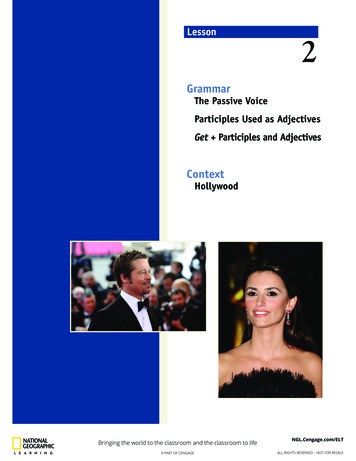
Transcription
Lesson2GrammarThe Passive VoiceParticiples Used as AdjectivesGet Participles and AdjectivesContextHollywood
2.1 The Passive Voice—An OverviewWe use the passive voice when the subject of the sentence is the receiverof the action.EXAMPLESEXPLANATIONPopcorn is sold in movie theaters.Old movies were filmed in black and white.Many movies have been made in Hollywood.Passive verb a form of be past participlesubjectverb objectuUuCompare active and passive. The object of theactive sentence (movie) is the subject of thepassive sentence.Active: The children saw the movie.subjectverbby agentuuuPassive: The movie was seen by the children.If the agent of the action (the personwho performs the action) is mentioned, itfollows by.The OscarsBeforeYou Read1. Who is your favorite actor? Who is your favorite actress?2. What movies have you seen recently?CD 1, TR 08Read the following magazine article. Pay special attention to verbsin the passive voice.The Academy Awards are given out everyyear to recognize outstanding work ofmovie actors, directors, and others whoare part of the movie-making industry.Did YouKnow?Walt Disney haswon the mostOscars ever: 26.60Lesson 2These awards, called Oscars, are presented in a formalceremony in Hollywood. Several people are nominatedin specific categories, such as Best Movie, Best Actor, Best Music, and BestCostumes. One nominee is chosen to receive an award in each category.When the awards ceremony started in 1929, 15 awards were presented andthe ceremony was attended by only 250 people. Tickets cost 10, and anyonewho could afford a ticket could attend. Today about two dozen Oscars arepresented. Tickets are no longer sold to the general public; invitations are sentonly to people involved in making the movies and to their guests. Today theawards are presented in the 3400-seat Kodak Theatre in Hollywood.Until 1941, the winners’ names were already known before the ceremony andpublished in newspapers the night before the ceremony. Now the winners’ names
are placed in sealed envelopes and the envelopes are not opened until the night ofthe ceremony.Since 1953, Oscar night has been televised and broadcast all over theworld. This show is seen by hundreds of millions of people. Viewers watch astheir favorite movie stars arrive looking beautiful and hopeful.2.2 The Passive Voice—FormCompare active voice and passive voice in different tenses.TenseActivePassive Be Past ParticipleSimple PresentA committee chooses the winner.The winner is chosen by acommittee.Present ContinuousThey are presenting an award now.An award is being presented now.FutureThey will pick the best movie.They are going to pick the bestmovie.The best movie will be picked.The best movie is going to bepicked.Simple PastThey announced the winner’sname.The winner’s name wasannounced.Past ContinuousThey were interviewing thewinners.The winners were beinginterviewed.Present PerfectThey have chosen the best movie.The best movie has been chosen.ModalYou can see the movie on DVD.The movie can be seen on DVD.Language Notes:1. Both the active voice and the passive voice can be used with different tenses and with modals.The tense of the passive sentence is shown in the verb be. Use the past participle with every tense.2. If two verbs in the passive voice are connected with and, do not repeat be.The Oscar ceremony is televised and seen by millions of people.(continued)The Passive Voice; Participles Used as Adjectives; Get Participles and Adjectives61
EXAMPLESEXPLANATIONBefore 1941, the winners’ names were alreadyknown before the ceremony.Today the winners are never announced aheadof time.An adverb can be placed between theauxiliary verb and the main verb.Affirmative: The movie was filmed in the U.S.Negative: It wasn’t filmed in Canada.Yes/No Question: Was it filmed in Hollywood?Short Answer: No, it wasn’t.Wh- Question: Where was it filmed?Subject Question: Which movie was filmed in Canada?Observe affirmative statements,negative statements, and questionswith the passive voice. Never use do,does, or did with the passive voice.(Wrong: The movie didn’t filmed inCanada.)Active:Notice the difference in pronouns inan active sentence and a passivesentence. After by, the object pronounis used.She saw him.Passive: He was seen by her.Active:They helped us.Passive: We were helped by them.EXERCISEEXAMPLESRead the following sentences. Decide if the underlined verb isactive (A) or passive (P).The actress received an Oscar. AThe actress was given an Oscar.P1. The actress wore a beautiful gown.2. Halle Berry presented an Oscar.3. Halle Berry has been seen in many movies.4. The director has been nominated many times.5. Old movies were filmed in black and white.6. Many actors live in California.7. Many movies are made in Hollywood.8. The names of the winners will be printed in tomorrow’s newspaper.9. The actress thanked all the people who helped her win.10. The actress was driven to the ceremony in a white limousine.11. Hollywood was built at the beginning of the twentieth century.12. Hollywood has become the movie capital of the U.S.62Lesson 2
EXERCISEEXAMPLEFill in the blanks with the passive voice of the verb in parentheses.Use the tense or modal given.(simple present: give)isThe best actorgivenan Oscar.1. (simple present: see)The awards ceremonyby millions of people.2. (future: choose)Which actornext year?3. (modal: can / see)The movieat many theaters.4. (present perfect: make)Many moviesabout World War II.5. (simple past: give)Kate Winsletthe best actress award in 2009.6. (present continuous: show)A good movieat a theater nearmy house.7. (simple past: make)in 1977.Star Wars8. (present perfect: show)The movieon TV many times.9. (present perfect: give)Over 2,000 Academy Awardsoutsince 1929.10. (simple past: give)In 1929, only one awardto a woman.11. (simple past: add)WhensoundItto movies?in 1927.12. (simple present: often / make)Moviesin Hollywood.13. (present perfect: film)How many moviesin black andwhite?The Passive Voice; Participles Used as Adjectives; Get Participles and Adjectives63
2.3 Passive Voice and Active Voice—UsesEXAMPLESEXPLANATIONCompare:When the verb is in the active voice, thesubject performs the action. When the verbis in the passive voice, the subject receivesthe action.Active: The man ate the fish.Passive: The man was eatenby the fish.A.Active: I see the Academy Awards ceremonyevery year.Passive: The Academy Awards ceremony is seenby millions.B.Active: Do you know the winners’ names?Passive: The winners’ names are not knownuntil the night of the ceremony.The active voice focuses on the person whodoes the action. The passive voice focuseson the receiver or the result of the action.Sometimes the passive voice mentions theagent, the person who does the action (A).Sometimes it is not necessary to mentionthe agent (B and C).C.Active: The Academy presents awards to thebest actors and directors.Passive: The awards are presented every year.EXERCISEWrite an active sentence and a passive sentence for each subject.Choose an appropriate tense.has 12 questions.EXAMPLE Active: The testPassive: The test will be given in a large auditorium.1. Active: My textbookPassive: My textbook2. Active: My best friendPassive: My best friend3. Active: Some studentsPassive: Some students4. Active: IPassive: I64 Lesson 2
5. Active: ActorsPassive: Actors6. Active: MoviesPassive: Movies2.4 The Passive Voice Without an AgentThe passive voice is used more frequently without an agent than with an agent.EXAMPLESEXPLANATIONThe invitations have been sent out.The winners’ names are placed in envelopes.The passive voice is used when it is notimportant to mention who performed theaction.A.Active: Someone stole my wallet.Passive: My wallet was stolen last week.The passive voice is used when we do notknow the agent (A) or when we prefer notto mention the agent (B).B.Active: Someone told me that you like movies.Passive: I was told that you like movies.a. One person is chosen to receive the award.b. Oscar night has been televised since 1953.The passive voice is used when the agent isobvious and doesn’t need to be mentioned.a. It is obvious that the Academy choosesthe winner.b. It is obvious that TV stations havetelevised Oscar night.Compare Active (A) and Passive (P):A: You can rent DVDs at many stores.P: DVDs can be rented at many stores.In conversation, the active voice is oftenused with the impersonal subjects people,you, we, or they. In more formal speech andwriting, the passive is used with no agent.A: They sell popcorn in movie theaters.P: Popcorn is sold in movie theaters.EXERCISEFill in the blanks with the passive voice of the verb inparentheses ( ). Choose an appropriate tense.was builtEXAMPLE Hollywoodin the early 1900s.(build)1. Most American movies(make)2. Let’s get some popcorn. It’s fresh. Itin Hollywood.(make)right now.(continued)The Passive Voice; Participles Used as Adjectives; Get Participles and Adjectives65
3. Movie listings4. Childrenin the newspaper.(can/find)to see some movies.(not/allow)5. Hurry! The winnersin ten minutes.(announce)6. In 1929, only fifteen Oscars.(present)7. Before 1941, the winners’ namesin(publish)newspapers the night before the ceremony.8. A new theaternear my house at this time.(build)9. We can’t get into the movie theater because all the ticketsalready.(sell)10. Did you see the movie Harry Potter? Whereit?(film)11. I went to the lobby to buy popcorn, and my seat12. No one knows why the award13. Slumdog Millionaire(take)“Oscar.”(call)as the best film of 2009.(choose)14. In a movie theater, coming attractions1(show)before the feature film begins.15. Sound(add)to movies in 1927.16. The Kodak Theatre, where the awardseach year,(build)(present)in 2001.Coming attractions are short previews of new movies. Theaters show coming attractions to get your interest inreturning to the theater to see a new movie.166Lesson 2.
2.5 The Passive Voice with an AgentSometimes the passive voice is used with an agent.ACTIVEPASSIVEActive: Steven Spielberg has mademany movies.Passive: Many movies have beenmade by Steven Spielberg.When the sentence has a strong agent(a specific person: Steven Spielberg, RalphLauren), we can use either the active orthe passive voice. The active voice putsmore emphasis on the person who performsthe action. The passive voice puts moreemphasis on the action or the result. Ingeneral, the active voice is more commonthan the passive voice when an agent ismentioned.Active: Ralph Lauren designsmany of the actresses’ gowns.Passive: Many of the actresses’gowns are designed by RalphLauren.Active: The first Oscar ceremony took placein 1929.Passive: It was attended by 250 people.Sometimes the passive voice is used tocontinue with the same subject of thepreceding sentence.Active: The Oscar ceremony is popular all overthe world.Passive: It is seen by millions of viewers eachyear.Active: Steven Spielberg directed Star Wars,didn’t he?Passive: No. Star Wars was directed byGeorge Lucas.We can use the passive voice to shift theemphasis to the object of the precedingsentence.Passive: The dress was designed by Vera Wang.Passive: The music was composed by BobDylan.Passive: The movie projector was invented byThomas Edison.We often use the passive voice whenthe agent made, discovered, invented,designed, built, wrote, painted, or composedsomething.The song was written by Randy Newman.It was performed by him too.When the agent is included, use by nounor object pronoun.The Passive Voice; Participles Used as Adjectives; Get Participles and Adjectives67
EXERCISEFill in the blanks with the passive voice of the verb inparentheses ( ). Use the past tense.1. Mickey Mouseby Walt Disney.(create)2. The movie projectorby Thomas Edison.(invent)3. Romeo and Julietby William Shakespeare in 1595.(write)4. Romeo and Juliet5. My Heart Will Go On6. Star Warsinto a movie in 1968.(make)by Celine Dion.(sing)by George Lucas.(direct)EXERCISEFill in the blanks with the active or passive voice of the verb inparentheses ( ). Use the tense indicated.sawEXAMPLES Ian old movie on TV last night.(past: see)was filmedThe moviewill be shownItin black and white.(past: film)again on TV tonight.(future: show)1. Many movies(present: make)2. Steven Spielberg3. Wea DVD this weekend.beautiful dresses.(present: design)5. The actressmany movies.(present perfect: make)(future: rent)4. Vera Wangin Hollywood.(past continuous: wear)a dress that(past: design)by Ralph Lauren.6. Who(past: write)(past: write)the music for the movie? The musicby Randy Newman.7. The first Academy Awards presentation250 guests.8. I68Lesson 2(present perfect: never/see)Star Wars.(past: have)
9. Computer animation10. Movie reviewersin many movies.(present: use)predictions weeks before(present: make)the Oscar presentation.11. Oscar winnersthe people who helped them.(present: always/thank)2.6 Verbs with Two ObjectsSome verbs have two objects: a direct object (D.O.) and an indirect object (I.O.).I.O.D.O.Active: They gave Spielberg an award.When an active sentence has two objects,the passive sentence can begin with eitherobject. Notice that if the direct object(an award) becomes the subject of thepassive sentence, to is used before theindirect object.uEXPLANATIONuEXAMPLESPassive 1: Spielberg was given an award.Passive 2: An award was given to Spielberg.Language Note: Some verbs that use two objects AMPLEserveshowtaketeachtellwriteChange the following sentences to passive voice in two ways.Omit the agent.They gave the actress an award.The actress was given an award.An award was given to the actress.1. They handed the actress an Oscar.2. Someone served the guests dinner.(continued)The Passive Voice; Participles Used as Adjectives; Get Participles and Adjectives69
3. Someone told the students the answers.4. Someone will send you an invitation.5. They have shown us the movie.6. They will give the winners flowers.7. Someone has given you the key.The History of AnimationBeforeYou Read1. Do you know how cartoons are created?2. Are cartoons just for children? Do adults enjoy cartoons too?Gertie the DinosaurCreated by Winsor McCay70Lesson 2
CD 1, TR 09Read the following textbook article. Pay special attention to activeand passive verbs.Animated movies havechanged a lot over the last100 years. Winsor McCay isconsidered the father ofanimation. In the early 1900s,McCay animated his films byhimself. He drew every pictureseparately and had themphotographed, one at a time.Hundreds of photographs wereneeded to make a one-minutefilm. Sometimes it would take himmore than a year to make afive-minute cartoon.In 1914, the development ofcelluloid (a transparent material)made animation easier. Instead ofdrawing each picture separately,Walt Disneythe animator could make adrawing of the background, which remained motionless, while only thecharacters moved.Walt Disney took animation to a new level. He created MickeyMouse, added sound and music to his movies, and produced the firstfull-length animated film, Snow White and the Seven Dwarfs. Many peoplethink he was a great cartoonist, but he wasn’t. Instead, he was a greatstory editor and clever businessman who had other artists do most ofthe drawings.Today most animated films are not drawn by hand. The animationis done by computer software. Also special effects for movies, such asStar Wars, are done by computer animation. To create the illusion ofmovement, an image is put on the computer and then quickly replacedby a similar image with a small change. While this technique is similarto hand-drawn animation, the work can be done much faster bycomputer. In fact, anyone with a home computer and special softwarecan create a simple animation.(continued)The Passive Voice; Participles Used as Adjectives; Get Participles and Adjectives71
1901 Walt Disney was born.1914 Winsor McCay created the first animation on film, Gertie theDinosaur.1918 Walt Disney opened a cartoon studio in Kansas City, Missouri.1923 Disney moved his studio to Hollywood.1928 The first Mickey Mouse cartoon was introduced. It was the firsttalking cartoon.1937 Disney produced Snow White and the Seven Dwarfs, the firstfull-length animated cartoon.1995 Toy Story became the first full-length film animated entirely oncomputers.2009 WALL-E won the Academy Award for best animated film.72Lesson 2
2.7 Transitive and Intransitive : McCay created the first animated film.Passive: The first animated film was createdin 1914.verbobjectMost active verbs are followed by anobject. They can be used in the activeand passive voice. These verbs are calledtransitive verbs.uuActive: Walt Disney didn’t draw his cartoons.Passive: His cartoons were drawn by studioartists.Active Only:Disney lived in Hollywood most of his life.He became famous when he created MickeyMouse.He worked with many artists.What happened to the first Mickey Mousecartoon? I’d like to see it.Some verbs have no object. We cannot usethe passive voice with these staybecomehappenrecoverwalkcomeliveremainworkThese are called intransitive verbs.Compare:a. Disney left Kansas City in 1923.b. The DVD was left in the DVD player.Leave can be intransitive or transitive,depending on its meaning.In sentence (a), leave means “go awayfrom.” It is an intransitive verb. It has nopassive form.In sentence (b), leave means “not taken.”It is a transitive verb. It has a passive form.Compare:a. Cartoons have changed a lotover the years.b. The light bulb waschanged by the janitor.Change and move can be intransitive ortransitive.a. In a cartoon, it looks like the characters aremoving, but they are not.b. The chairs were movedto another room.Compare:Walt Disney was born in 1901.He died in 1966.When a change happens through anatural process (a), it is intransitive.When someone specific causes thechange (b), it is transitive.Notice that we use was/were with born,but we don’t use the passive voice with die.Born is not a verb. It is a past participleused as an adjective.The Passive Voice; Participles Used as Adjectives; Get Participles and Adjectives73
EXERCISE 8EXAMPLESWhich of the following sentences can be changed to passive voice?Change those sentences. If no change is possible, write no change.Today they create most animation with computer software.Today most animation is created with computer software.Walt Disney moved to Hollywood in 1923.No change.1. What happened at the end of the movie?2. Someone left a box of popcorn on the seat.3. Many movie stars live in California.4. Paul Newman was a famous actor. He died in 2008.5. I slept during the movie.6. You can rent Finding Nemo on DVD.7. They will show a movie at 9:30 in the auditorium.8. They have sold all the tickets.EXERCISE 9Fill in the blanks with the active or passive form of the verb inparentheses ( ). Use the tense indicated.wasEXAMPLES Walt Disneya clever businessman.(past: be)His cartoonsare seen1. Walt DisneyMickey Mouse.(past: not/draw)3. Most of his cartoons74Lesson 2famous when he(past: become)(past: create)2. Walt Disneyall over the world.(present: see)most of his cartoon characters.(past: draw)by studio artists.
4. Walt Disney26 Oscars.(past: give)5. Walt Disneyhis studio to Hollywood.(past: move)6. Walt Disneyin Hollywood most of his life.(past: live)7. Disneyin 1966.(past: die)8. Today’s animationsusing computers.(present: create)9. Cartoon characters look like they10. Even today, Disney’s old cartoonsEXERCISE 10.(present continuous: move)beautiful.(present: look)Fill in the blanks with the active or passive form of the verb inparentheses ( ). Use the past tense.CD 1, TR 10was electedRonald Reagan(example: elect)United States in 1980. Before hepresident of thebecame(example: become)president, he was governor of California. Even beforethat, heas a Hollywood actor.(1 work)Hein 53 Hollywood movies between(2 appear)1937 and 1964. Hehe nevera great actor, and(3 not/consider)an Oscar.(4 win)On March 20, 1981, the day the Oscar ceremony(5 schedule)(6 happen)to take place, something terrible. Reaganassassination attempt. Fortunately, he(7 shoot)in an(8 past: not/die)from his wounds. One of his aides, who was with him at the time,(9 also/wound). Out of respect for the president, the AcademyAwards ceremony(11 recover)(12 finish)(10 postpone)for one day. Reaganand continued to serve as president until hehis second term in 1989. He(13 die)in 2004 at the age of 93.The Passive Voice; Participles Used as Adjectives; Get Participles and Adjectives75
EXERCISE 11Find the mistakes with the underlined verbs in the sentences belowand correct them. Not every sentence has a mistake. If the sentenceis correct, write C.wereEXAMPLES Before the 1950s, most movies filmed in black and white.ˆI like old movies. C1. We went to see a movie.2. I don’t like scary movies. I can’t be slept afterwards.3. Did the movie directed by Steven Spielberg?4. People in the audience are eaten popcorn.5. The popcorn is fresh. It is been popped right now.6. Popcorn sells in the lobby of the theater.7. Before the movie, coming attractions are show.8. At the end of the movie, we were left the theater and went home.9. A lot of popcorn containers and candy wrappers was left on the floorof the theater.10. Some movies can be enjoy by the whole family.11. Tickets can bought online ahead of time.12. What was happened? I can’t find my ticket.13. The theater is big. Fourteen movies are shown at the same time.14. The movie is for adults. Children don’t permitted to enter.15. I enjoyed the movie. Did you?16. Parking is free at the theater, but the parking pass must be validatedin the theater.17. Some movies should not seen by children.18. Senior citizens can get a discount on tickets.19. At the Oscar ceremony, the actors are arrived in limousines.20. The actresses wear beautiful dresses.76Lesson 2
2.8 The Passive Voice with GetEXAMPLESEXPLANATIONHollywood actors get paid a lot of money.I don’t like violent movies. A lot of people getshot and killed.In conversation, we sometimes use getinstead of be with the passive.get paid be paidget shot be shotget killed be killedWe usually omit the agent after get.Compare:He was shot by a cowboy.He got shot three times.How much do actors get paid for a movie?She didn’t get paid last Friday.When get is used with the passive voice,questions and negatives are formed withdo, does, did, and other auxiliaries. Be isnot used with get.Wrong: She wasn’t get paid last Friday.She got hired for the job.He got laid off last month.Get is frequently used with: shot, killed,injured, wounded, paid, hired, fired, laid off,picked, caught, done, sent, stolen.EXERCISE 12Fill in the blanks with get the past participle of the verb inparentheses ( ). Choose an appropriate tense.got chosenEXAMPLE Whofor the part in the movie?(choose)1. Reagan2. No one3. Did you.(kill)for the movie role?(hire)4. Famous actors5. His caron the day of the Oscars.(shoot)millions of dollars for a film.(pay)from in front of his house.(steal)6. The little boy told a lie, and he7. Everything will8. The test scores9. One student(do)(send)(catch)10. If you leave your car there, it might.(punish)little by little.to the wrong person.cheating on the exam.(tow).The Passive Voice; Participles Used as Adjectives; Get Participles and Adjectives77
2.9 Participles Used as AdjectivesA present participle is verb -ing. A past participle is the third formof the verb (usually -ed or -en). Both present participles and pastparticiples can be used as adjectives.EXAMPLESEXPLANATIONWe saw an entertaining movie.Star Wars is an exciting movie.The Matrix has amazing visual effects.In these examples, a present participle is usedas an adjective.What’s in the sealed envelope?I wasn’t bored during the movie.Are you interested in action movies?Do you like animated films?In these examples, a past participle is usedas an adjective.Charlie ChaplinBeforeYou Read1. Have you ever heard of Charlie Chaplin?2. Have you ever seen a silent movie? Do you think a silent movie can beinteresting today?CD 1, TR 11Read the following magazine article. Pay special attention toparticiples used as adjectives.Charlie Chaplin was one of thegreatest actors in the world. Hisentertaining silent movies are still populartoday. His amusing character “Little Tramp”is well known to people throughout theworld. Chaplin had an amazing life. His ideafor this poor character in worn-out shoes,round hat, and cane probably came from hischildhood experiences.Born in poverty in London in 1889,Chaplin was abandoned by his father and leftCharlie Chaplin, 1889–1977in an orphanage by his mother. He becameinterested in acting at the age of five. At ten, he left school to travel with aBritish acting company. In 1910, he made his first trip to America. He wastalented, athletic, and hardworking, and by 1916 he was earning 10,00078Lesson 2
Did YouKnow?When RonaldReagan wasgovernor ofCalifornia, he didnot want Chaplin tobe allowed backinto the U.S.a week.2 He was the highest-paid person in the world at that time. Heproduced, directed, and wrote the movies he starred in.Even though “talkies” came out in 1927, he didn’t make a movie withsound until 1940, when he played a comic version of the terrifying dictator,Adolf Hitler.As Chaplin got older, he faced declining popularity as a result of hispolitics and personal relationships. After he left the U.S. in 1952, Chaplinwas not allowed to re-enter because of his political views. He didn’t returnto the U.S. until 1972, when he was given a special Oscar for his lifetime ofoutstanding work.2.10 Participles Used as Adjectives to Show FeelingsThe participles of a verb can be used as adjectives.Chaplin’s movies interest us.(verb)Chaplin’s movies are interesting.We are interested in his movies.(present participle)(past participle)EXAMPLESEXPLANATIONThe movie bored us. (bored verb)In some cases, both the present participle(a) and the past participle (b) of the sameverb can be used as adjectives.The present participle (a) gives an activemeaning. The movie actively caused afeeling of boredom.The past participle (b) gives a passivemeaning. It describes the receiver of afeeling. The people were bored by the movie.a. The movie was boring. I left the boringmovie before it was over.b. Some people were bored. The bored peoplegot up and left.Chaplin had an interesting life. He was poorand then became very rich.I am interested in Chaplin. I would like toknow more about him.A person can cause a feeling in others or hecan receive a feeling. Therefore, a personcan be both interesting and interested,frightening and frightened, etc.The main character in Friday the 13th is afrightening man.I was frightened and couldn’t sleep after seeingthe movie.The book is interesting.The movie is entertaining.2An object (like a book or a movie) doesn’thave feelings, so a past participle, such asinterested or entertained, cannot be used todescribe an object.In today's dollars, that amount would be close to 200,000 a week.(continued)The Passive Voice; Participles Used as Adjectives; Get Participles and Adjectives79
Language Notes:1. The following pictures show the difference between (a) a frightening man and (b) a frightened man.a. The man is frighteningthe children. He’s afrightening man.b. The man is frightenedby the robber. He’s afrightened man.2. Common paired participles citedEXERCISE ngpuzzlingsatisfyingsurprisingterrifyingtiringUse the verb in each sentence to make two new sentences. Inone sentence, use the present participle. In the other, use thepast participle.The game entertains the children.The game is entertaining.The children are entertained.1. The movie frightened the children.2. The book interests the children.3. The children are amusing the adults.4. The trip tired the children.80Lesson isfiedsurprisedterrifiedtired
5. The game excited the children.6. The vacation exhausted the adults.7. The movie bored the adults.8. Chaplin interests me.EXERCISE 14CD 1, TR 12Fill in the blanks with the correct participle, present or past, of theverb in parentheses ( ).Last night my friend and I went to see a new movie. We thought itwasboring(example: bore)were not. It had a lot of stupid car chases, whichat all. And I didn’t like the characters.(1 excite)They weren’t veryWe were pretty(2 convince).(3 disappoint)good movie. They said it hadme, it wasn’t(5 interest)because the reviewers said it was a(4 amaze)at all. I wasvisual effects. But for(6 annoy)wasted 10 and a whole evening for such aThe only thing that wasEXERCISE 15(8 satisfy)that I(7 disappoint)movie.was the popcorn.Fill in the blanks and discuss your answers.EXAMPLE I’m interested in sportsABOUT YOU1. I’m interested in.movies.2. Now I’m worried about.3. In the past, I was worried about.4. In my opinion,is an amazing (choose one)actor / athlete / politician.5. I’m not interested inThe Passive Voice; Participles Used as Adjectives; Get Participles and Adjectives.81
6. I’m annoyed when people7.is a boring subject for me.8. I feel frustrated when.9. I am amazed thatin the U.S.10. It’s not surprising thatin the U.S.11. Sometimes I feel embarrassed when I.12. I was very excited when.13. When I came to this school, I was surprised that.2.11 Other Past Participles Used as AdjectivesSome sentences look passive (be past participle), but there is no action in thesentence. The past participles below are used as adjectives.EXAMPLESEXPLANATIONa. No one knows the winners’ names becausethe envelope is sealed.b. Is this seat taken?c. Chaplin was born in England.d. The dress is made of silk.e. The door is locked now.f. He b
A: They sell popcorn in movie theaters. P: Popcorn is sold in movie theaters. In conversation, the active voice is often used with the impersonal subjects people, you, we, or they. In more formal speech and writing, the passive is used with no agent. Fill in the blanks with the passive voice











